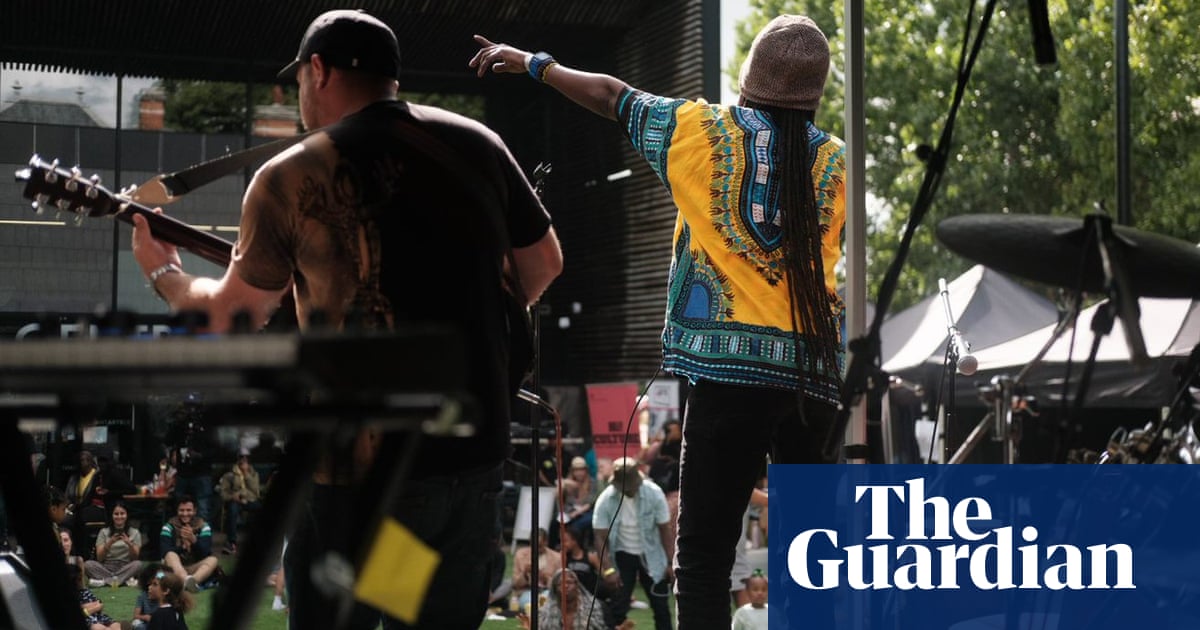
Lamin Joof began making music in the Gambia at the age of 16. He sang in a band called Chossan Bi with three friends until, one by one, everyone but Joof left the country to find work elsewhere. After the group disbanded, Joof began DJing at nightclubs and wedding parties and formed a sound system of reggae artists. But, despite spending a year building a musical career, Joof struggled to sustain himself. In 2015, he left the Gambia to find employment in the UK. There he was detained for nine months in three immigration detention centres.
“Most of the tunes I make now are inspired by that experience,” Joof says today, speaking via video. “When I was at Brook House in Gatwick, the only outside space was a smoking area, which was tiny and [crowded]. Above was a net instead of the sky. Detention centres are similar to prison, but it’s worse than prison because you don’t have a release date. In my music, I want to convey the struggle that I went through, how I was mistreated, and how I fought to get to where I am today.”
While detained at the now-shuttered Dover Immigration Removal Centre, Joof attended music workshops facilitated by Hear Me Out, a charity founded in 2006 to bring musicians into these centres to create music with detainees. “They gave me a voice to send out to the world again,” says Joof. “It was the gift of paradise.”
After his release in 2016, Joof became one of the charity’s trustees, as well as a member of its house band. Formed in Dover during a residency in 2019, the Hear Me Out Band’s rotating lineup is made up of musicians who either have experience of working with detainees or being detained themselves. Today, they run workshops, perform in detention centres and public spaces, and record their own music that is distributed through the charity.
“We meet so many people in immigrant detention centres who are incredible musicians – I’ve even worked with a 12-string guitarist,” says Anna De Mutiis, a percussionist, workshop facilitator and Hear Me Out Band member, speaking from the charity’s office in London. “The band formed because many of us connected during workshops in little pockets of joy. We stayed in touch and wanted to keep playing music together.”
Hear Me Out was formed around the idea that music can provide comfort, joy and expression to people in difficult circumstances. Its work is inspired by historical examples, such as the music of Chilean political prisoners during Pinochet’s dictatorship and of concentration camps during the second world war. “We’re not saying that detention centres are the same as concentration camps, but we are interested in music as wellbeing and resilience,” says Hear Me Out artistic director Gini Simpson.
Every year 24,000 people are detained in UK immigration detention centres without a release date. Although, by law, centres should provide activities for detainees, most are severely under-resourced. “The Home Office contracts out detention centres to companies with shareholders who want a profit,” says Simpson. “Sometimes a centre asks us to come in but it can be difficult working with a system that is always changing. We always have to be flexible around it; it’s never flexible around us.”
The Hear Me Out Band currently has seven members, from Iran, Italy, Nigeria, the Gambia and the UK. Each musician brings their own history to the band’s recording sessions, which take place in professional studios. “There’s reggae, hip-hop, jazz, gospel singing, electronic influences,” says De Mutiis. “Someone comes up with an idea and someone else responds. There’s a powerful energy in the room when we bring all our influences together and see where the music takes us.”
Rather than creative disagreements or inflated egos (“we learn from each other and grow musically with each other,” says Joof) the band’s dynamic is more frequently disrupted by the UK’s constantly changing immigration system. “Once I was in a workshop and somebody got released in the middle of the workshop, fortunately back into the community,” says Simpson. “Or, you’ll show up to a centre and find that an amazing, key musician has been deported.”
Live, the Hear Me Out Band plays music the members create together, as well as workshop collaborations with detainees. One upbeat song, A Cuppa Tea, about extending kindness, is particularly memorable. “It was written by a musician we worked with frequently, who has now been deported to Jamaica,” says Simpson. “In the UK, cups of tea are about welcoming people and yet there he was in a detention centre.”
“We still play his song at our concerts,” says De Mutiis.
Joof and De Mutiis will soon begin rehearsals for the band’s first concert of 2023. Both members see this performance as a celebration of Hear Me Out’s work, but they also recognise an opportunity for education. “There are a lot of people who still don’t know about detention centres,” says Joof. “I want to make people aware of what goes on inside them and what got me through those nine months to be here today: faith, strength, unity and music.”












